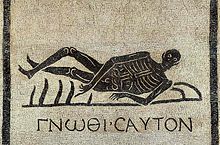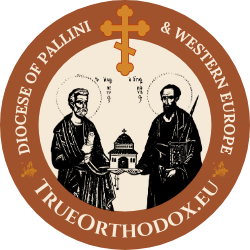“Know Thyself”

The Ancient Greek adage “Know Thyself” («Γνῶθι σαὐτόν») often attributed to Chilon of Sparta (600 BC) but also to multiple other Greek philosophers, was one of the Delphic maxims and the first of three aphorisms inscribed on the pronaos of the Temple of Apollo at Delphi according to Ancient Greek writer, traveler, and geographer Pausanias. The other two maxims following “Know Thyself” were “Nothing to Excess” and “Surety brings Ruin”.
The adage was soon picked up by Christian writers as its truth is in line with Christian virtue and the road that leads to it. This can be shown also by a mosaic from excavations in the Convent of San Gregorio in Rome.

Even familiar everyday figures like Benjamin Franklin used this ancient adage. In 1750, in his Poor Richard’s Almanack, Franklin observed the great difficulty of knowing one’s self, by stating: “There are three Things extremely hard, steel, a diamond, and to know one’s self.”
Truly, how can anyone better himself if he doesn’t start by knowing himself and his own weaknesses? Isn’t this what the Fathers mean when they speak about “watchfulness”? St. Isaac the Syrian says, “Blessed is the man who knows his own weakness”.
How much do I truly desire and thus work for my own salvation? In great and difficult acts, a person must have a fiery desire to achieve and in this way reach successfully his goal. Otherwise, a person doesn’t successfully conquer the impediments that stand against him to reach the goal he desires.








And Shakespeare wrote: This above all: to thine own self be true. Act 1, Scene III of Hamlet,